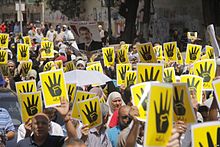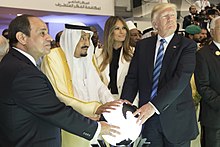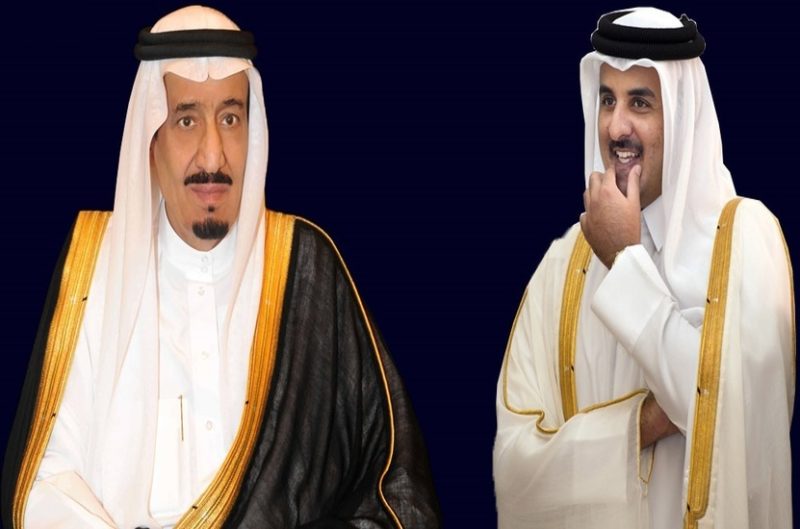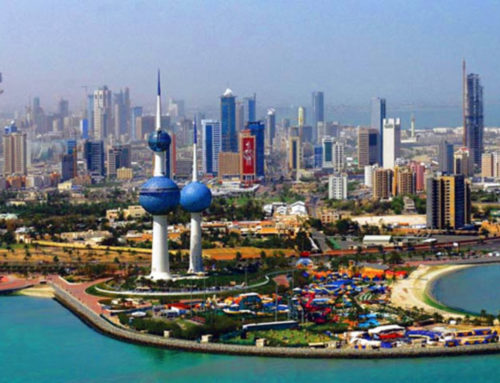The 2017 Qatar diplomatic crisis, also known as Qatar-Gulf crisis[12] or simply Gulf crisis began when several countries abruptly cut off diplomatic relations with Qatar in June 2017. These countries included Saudi Arabia, United Arab Emirates, Bahrain, and Egypt. The severing of relations included withdrawing ambassadors, and imposing trade and travel bans.
The Saudi-led coalition cited Qatar’s alleged support for terrorism as the main reason for their actions, insisting Qatar has violated a 2014 agreement with members of the Gulf Cooperation Council (GCC).[13] Saudi Arabia and other countries have criticized Al Jazeera and Qatar’s relations with Iran. Qatar claims that it has assisted the United States in the War on Terror and the ongoing military intervention against ISIL.[14]
Saudi Arabia’s move was welcomed by United States president Donald Trump despite a large U.S. presence at the Al Udeid Air Base, the primary base of U.S. air operations against the Islamic State of Iraq and the Levant.[15] However, Secretary of State Rex W. Tillerson and Defense Secretary James Mattis are working on de-escalating the situation.[16] Tillerson, as the CEO of ExxonMobil, had acquaintances with the current and previous emirs of Qatar.[17] A number of countries in the region, including Turkey, Russia and Iran, called for the crisis to be resolved through peaceful negotiations.
On 27 July 2017, ongoing diplomatic crisis, the Qatari foreign minister Al Thani told reporters that Egypt, Saudi Arabia, United Arab Emirates and Bahrain were showing “stubbornness” and had not taken any steps to solve the crisis. Al Thani added that the Security Council, the General Assembly and “all the United Nations mechanisms” could play a role in resolving the situation
Background
Qatar has had differences with other Arab governments on a number of issues: it broadcasts Al Jazeera; it is accused of maintaining good relations with Iran; and it has supported the Muslim Brotherhood in the past.[19] Qatar is a close ally of the United States, hosting the largest American base in the Middle East, Al Udeid Air Base.[20]
The countries withdrawing diplomatic relations accuse Qatar of supporting terrorism, of interfering with their internal affairs[21] and of maintaining relations with Iran.[22][23] Qatar denies allegations that it supported terrorism, and pointed out that it has been contributing to the U.S.-led fight against ISIL.
The countries have also stressed the measures are in response to Qatar’s violation of an agreement[25] in 2014 to not undermine the “interests, security and stability” of other Gulf Cooperation Council (GCC) countries.[26]
Issues of contention
Qatar maintains relatively good relations with Iran. In 2006, Qatar was the only UN Security Council member to vote against United Nations Security Council Resolution 1696, which was calling on Iran to halt its nuclear enrichment program (which for Saudi Arabia is a very serious issue of national security).[27] Qatar and Iran share ownership of the South Pars/North Dome Gas-Condensate field,[28] by far the world’s largest natural gas field, with significant geostrategic influence.[29] In April 2017, after a 12-year freeze, Qatar lifted a self-imposed ban on developing the gas field with Iran,[30] which would require cooperation between the two countries.[31] According to Jim Krane, energy research fellow at Rice University’s Baker Institute, “Qatar used to be a kind of Saudi vassal state, but it used the autonomy that its gas wealth created to carve out an independent role for itself… Above all, gas prompted Qatar to promote a regional policy of engagement with Shiite Iran to secure the source of its wealth”.[32] According to David Roberts, a Qatar foreign policy expert at King’s College, London, if a conflict erupts between America and Iran, Qatar would literally be caught in the middle. “If you are Qatar, you look across the water and you think, when Iran did have the opportunity to take a few Arab islands, they did it” “Qatar needs to have the ability to peacefully go about their business of sucking all the gas out of that giant field.” Iran could make that process very difficult.[33] A senior fellow of Middle Eastern studies at the Council on Foreign Relations concludes that “There’s a recognition of the general tendencies of the Gulf states to hedge their bets,””There’s always a question in the back of the minds of the leadership–how much faith can they put in the U.S.?”[33]
Since he took power in 1995, Hamad bin Khalifa al-Thani believed Qatar could find security only by transforming itself from a Saudi appendage to a rival of Saudi Arabia.[34] Saudi Arabia withdrew its ambassador to Doha from 2002 to 2008 to try to pressure Qatar to curb its individualistic tendencies. This approach broadly failed.[35]
The crisis has turned into a proxy battle between partners and adversaries of Iran[36] and UAE politicians claim that “Qatar invests billions of dollars in the U.S. and Europe and then recycles the profits to support Hamas, the Muslim Brotherhood and groups linked to al Qaeda. Qatar hosts the American military base from which the U.S. directs its regional war against extremism, yet it also owns media networks responsible for inciting many of the same extremists”.
Qatar also used its contacts to help negotiate peaceful exchanges of hostages for the safe evacuation of civilians from areas affected by the Syrian Civil War.[19] However, Qatar also sent its forces to fight against alleged Iranian-backed militias in the current Yemeni Civil War and has supported rebels fighting the Iranian-allied government of Bashar al-Assad in the Syrian Civil War.[19]
Qatar has supported the Muslim Brotherhood in the past.[39] Saudi Arabia and other Gulf monarchies see the Muslim Brotherhood as a threat, as it ideologically opposes hereditary rule.[39] The government of Egypt has long viewed the Muslim Brotherhood as “enemy number one”.[40] In 2011, during the Arab Spring, Qatar supported the Egyptian protesters agitating for change, as well as the Muslim Brotherhood.[41] By contrast, Saudi Arabia supported Hosni Mubarak and currently supports Abdel Fattah el-Sisi[42]
Qatar has been accused of sponsoring terrorism.[43] Some countries have faulted Qatar for funding rebel groups in Syria, including al-Qaeda’s affiliate in Syria, the al-Nusra Front,[44] although the Saudis have done the same.[19][45][46][47][48] Both Qatar and Saudi Arabia have been involved in the CIA–led Timber Sycamore covert operation to train and arm Syrian rebels.[49][50]
Qatar has hosted officials from the Afghan Taliban[51] and Hamas. Qatar defends this move by saying it is trying to act as an intermediary in regional conflicts.[52] For example, Qatar hosted talks between the Taliban and the Afghan government in 2016.[53]
On 27 May 2017, the newly-reelected Iranian President Hassan Rouhani held a phone call with Qatar’s Emir Tamim bin Hamad Al Thani.[54] Rouhani told Qatar’s emir, “The countries of the region need more cooperation and consultations to resolve the crisis in the region and we are ready to cooperate in this field.”[55]
On 13 July 2017, Bob Corker, a Republican senator and the chairman of the US Senate Committee on Foreign Relations, stated that the “[t]he amount of support for terrorism by Saudi Arabia dwarfs what Qatar is doing”.[56]
Former US Defense Secretary and ex-CIA chief Robert Gates stated in May 2017 that he does not “know instances in which Qatar aggressively goes after (terror finance) networks of Hamas, Taliban, Al-Qaeda,”[57] and that “My attitudes toward Al-Udeid and any other facility is that the United States military doesn’t have any irreplaceable facility.”[58][59] Qatar hosts the largest American base in the Middle East, the Al Udeid Air Base, which has been used by the United States in its campaigns in Iraq, Syria and Afghanistan.[20][60] According to the WSJ, during President Barack Obama’s first term, some members of his National Security Council lobbied to pull a U.S. fighter jet squadron out of Al Udeid to protest Qatari support of militant groups in the Middle East.[61]
The Qatari al-Jazeera is a media organization owned by the Emir of Qatar. It is the most popular network in the Middle East, and its news network has criticized foreign governments involved in the dispute and been accused of supporting Qatari interests. As well, it is Islamist and has been criticized for that as well. The Saudi-led coalition against Qatar has demanded that al-Jazeera be shut down. [62]
Previous diplomatic incidents
In 2002, Saudi Arabia removed their ambassador from Qatar over Al Jazeera’s alleged critical stance towards Saudi Arabia. Diplomatic relations were re-established in 2008, after assurances that Al Jazeera would limit its coverage of Saudi Arabia.[63]
In March 2014, Bahrain, Saudi Arabia, and the United Arab Emirates removed their ambassadors from Qatar, citing interference with their internal affairs, but the situations were eventually defused after Qatar forced Brotherhood members to leave the country eight months later.[64][19][39]
In February 2015, Egypt–Qatar relations deteriorated after the Egyptian Air Force conducted airstrikes on suspected ISIL positions in neighboring Libya following the beheading of 21 Egyptian Coptic Christians.[65][66] The airstrikes were condemned by Al Jazeera, who broadcast images of civilian casualties.[66] Additionally, Qatar’s foreign ministry expressed reservations over the airstrikes. This prompted Tariq Adel, Egypt’s Arab League delegate, to accuse Qatar of supporting terrorism. Egyptian citizens also launched an online campaign denouncing the Qatari government.[67] The Gulf Cooperation Council rejected Egypt’s accusations and its secretary general regarded the statements to be false.[68] Shortly after, Qatar recalled its ambassador to Egypt for “consultations”
April 2017 hostage negotiations

Further information: 2015 Qatari hunters kidnapping
In April 2017, Qatar was involved in a deal with both Sunni and Shi’ite militants in Iraq and Syria. The deal had two goals. The immediate goal was to secure the return of 26 Qatari hostages (including Qatari royals) who had been kidnapped by Shi’ite militants while falcon hunting in Southern Iraq and kept in captivity for more than 16 months.[63][70] The second goal was to get both Sunni and Shi’ite militants in Syria to allow humanitarian aid to pass through and allow the safe evacuation of civilians.[70] According to the New York Times, this deal allowed the evacuation of at least 2,000 civilians from the Syrian village of Madaya alone.[70] What outraged Saudi Arabia and the UAE is the amount of money Qatar had to pay to secure the deal. According to the Financial Times Qatar paid $700 million to Iranian-backed Shi’a militias in Iraq, $120–140 million to Tahrir al-Sham, and $80 million to Ahrar al-Sham.
Riyadh Summit 2017

As part of the Riyadh Summit in late May 2017, many world leaders, including U.S. President Donald Trump visited the region. Trump gave strong support for Saudi Arabia’s efforts in fighting against states and groups allied with Iran and the Muslim Brotherhood, leading to an arms deal between the countries. Trump’s support may have induced other Sunni states to fall in line with Saudi Arabia to take a stance against Qatar.[19] Trump’s public support for Saudi Arabia emboldened the kingdom and sent a chill through other Gulf states, including Oman and Kuwait, that fear that any country that defies the Saudis or the United Arab Emirates could face ostracism as Qatar has.[71] The Saudi-led move was at once an opportunity for the GCC partners and Egypt to punish their adversaries in Doha, please their allies in Washington, and remove attention from their own shortcomings and challenges.[72]
Alleged hacking of Qatari websites
The Qatar News Agency website and other government media platforms were allegedly hacked in May 2017. According to Qatar-based Al Jazeera, hackers posted fake remarks on the official Qatar News Agency attributed to the Emir of Qatar, Sheikh Tamim bin Hamad Al Thani, that expressed support for Iran, Hamas, Hezbollah and Israel.[73] The emir was quoted as saying: “Iran represents a regional and Islamic power that cannot be ignored and it is unwise to face up against it. It is a big power in the stabilization of the region.”[74][54] Qatar reported that the statements were false and did not know their origin.[19] Despite this, the remarks were widely publicized in the various Arab news media, including UAE-based Sky News Arabia and Al Arabiya.[73] On 3 June 2017, the Twitter account of Bahraini foreign minister Khalid bin Ahmed Al Khalifa was hacked.[75]
Initially alleged Intelligence gathered by the US security agencies indicated that Russian hackers were behind the intrusion first reported by the Qataris.[76][77] However, a U.S. official briefed on the inquiry told the New York Times that it “was unclear whether the hackers were state-sponsored”[78] and The Guardian diplomatic editor Patrick Wintour reported that “It is believed that the Russian government was not involved in the hacks; instead, freelance hackers were paid to undertake the work on behalf of some other state or individual.”[77] A U.S. diplomat said that Russia and its ally Iran stood to benefit from sowing discord among U.S. allies in the region, “particularly if they made it more difficult for the United States to use Qatar as a major base.”[78] The FBI sent a team of investigators to Doha to help the Qatari government investigate the hacking incident.[79] Later New York Times reported that the hacking incidents may be part of long running cyberwar between Qatar and other Gulf countries that was only revealed to the public during the recent incidents and they noted how Saudi and UAE media picked up the statement made by the hacked media in less than 20 minutes and began interviewing many well-prepared commentators against Qatar.[80]
U.S. intelligence agencies believe that the hacking was done by the United Arab Emirates.[81]
Al Jazeera[edit] In May 2017, the email account of the UAE’s ambassador to the U.S., Yousef Al-Otaiba, was hacked. The emails were reported as “embarrassing”,[82] because they allegedly showed links between the UAE and the Foundation for Defense of Democracies.[82] The story was covered by Al Jazeera and HuffPost Arabi, both of which are funded by Qatar. Arab countries saw the media coverage of the alleged email hack as a provocation by Qatar,[83] and deepened the rift between the two sides.[84] On 9 June, Al Jazeera’s media network was the victim of a cyber attack across all its platforms.[85] Yousef al Otaiba has been reportedly linked to buy influence for UAE led campaigns in the White House







Leave A Comment